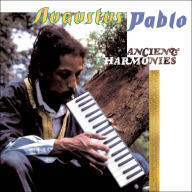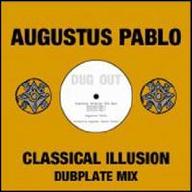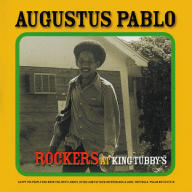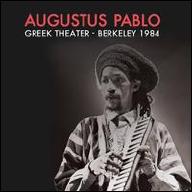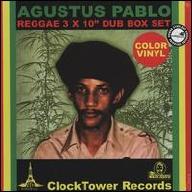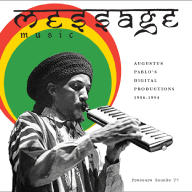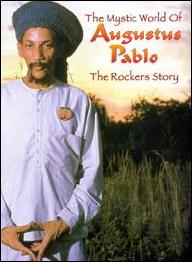Augustus Pablo was born Horace Swaby on June 21, 1954, in St. Andrew, Jamaica. He attended Kingston College (not a college in the American sense, but a high school), sneaking into the school's chapel with other musically inclined friends to practice on the organ. It was here at Kingston College where Swaby also made the connections that would help launch him into the music industry. Amongst his classmates was Clive Chin, whose family ran Randy's, Kingston's premier record store. The Chin clan included Herman Chin Loy, a cousin of Leslie Kong, and who started his own career in the music industry by working for his famous cousin. Like many small ethnic enclaves around the world, Jamaica's vibrant Chinese community often intermarried and thus businesses and families often intertwined. Chin Loy had struck out on his own in 1969, setting up his own record store and label, both called Aquarius. Thus in 1970, when the 15- year-old Swaby decided the time was ripe to begin his own musical career, Aquarius was his first stop. The fact that the teen was a friend of Clive Chin insured that he was given an audition, but it was his keyboard work that convinced Chin Loy to take him into the studio. The upbeat Iggy Iggy was the result of their first session and was credited to Augustus Pablo, a moniker Chin Loy frequently employed on his studio's instrumentals.
Over the next year, Pablo (the teen soon took the name as his own), cut several more singles for Chin Loy, Still Yet, The Mood, and Snowball Pudding, amongst them. But it was East of the River Nile that had the most startling impact. The instrumental featured a duet between Pablo's melodica and Glen Adam's organ, set to a seething rhythm the producer had bought from Lee Perry. Its haunting Oriental-esque melody ignited a fire on the island and launched the Far Eastern style. Minor key melodies surged from the grooves and the exotic now found a home in the Caribbean. Pablo briefly joined Mikey Chung's band, Now Generation, as keyboardist. Meanwhile, his old schoolmate Clive Chin was now working for the family business as a producer. (He had big shoes to fill, his older brother Vincent had made his mark producing such superstars as Alton Ellis and the Skatalites). Now that Clive was set up, Pablo left Now Generation and joined his friend in the studio. Their first fruits, in a round about way, was the seminal Java. Chin was already at work with another one of their schoolfriends Dennis Wright, the song's rhythm tracks were done but Wright was having trouble with the vocals and Chin decided to leave if for the day. Then Pablo entered the studio. While waiting in the hall, he'd come up with a melody line and suggested trying it out. Chin turned the tape recorder back on, Pablo picked up his melodica, and the rest is history. Java was a smash and the rhythm was one of the most influential of the day, versioned almost into oblivion. It was the beginning of an incredibly successful partnership, as Chin and Pablo recorded a stream of hits. It was a busy time as aside from recording with Chin, Pablo was also cutting singles for a number of other producers. He helped another member of the Chin clan, Clive's uncle, Leonard Chin, launch his Santic label with Pablo in Dub. Santic provided Pablo with his first opportunity to have a go at production, and he debuted with Paul Whiteman/Blackman's single Say So. Pablo continued recording for other producers, joining Lee Perry for Hot and Cold, linking with Gussie Clarke for No Entry and Born to Dub You, cuttinh Fat Baby and the Killer for Keith Hudson, and hooking up with Bunny Lee for The Great Pablo and Pablo's Desire. The latter track, a version of John Holt's My Desire, was another smash hit.
Pablo's partnership with Lee was particularly fruitful and he cut numerous instrumental B-side version for the producer, nine of which are featured alongside their vocal or DJ A-sides, on the Ras compilation Pablo Friends. Pablo had already come to the conclusion that no matter how big the hit nor how many sessions he played on, he would see little of the actual returns. Thus, he and his brother set up their own label, Rockers. The name was taken from the siblings sound system, which was already up and running. Over time, other imprints followed, Hot Stuff, Pablo International, Rockers International, and Message. Initially, Pablo's singles for his own label were instrumental versions of Studio One classics. Skanking Easy, Frozen Dub, Don Drummond, Pablo's Theme Song, and many more followed in re-creating songs of yore. And there's no doubt about the influence the studio's superb musicians had had on the young Swaby. Many of these song were less versions than tributes to these talented men. The U.K. label Greensleeves would bundle up many of the best self-productions from these early days for the Original Rockers compilation. Yet some of Pablo's best work was still being done with Clive Chin. In 1974, Chin and another family member, Pat Chin, oversaw Pablo's classic album Rebel Rock Reggae -- This Is Augustus Pablo. A masterpiece of mood and atmosphere, the instrumentals swing across the musical spectrum from Hollywood musicals to classic Jamaican hits. The album is actually a compilation and rounded up much of the artist's recent work for the Chin family, including his two earlier singles for Leonard. The following year, Pablo began collaborating with King Tubby, who had begun supplying Rockers with some of the label's most sublime mixes. The pair christened their partnership with Ital Dub, which was produced by Tommy Cowan and Warwick Lyn (another former employee of Leslie Kong). This album remains one of the most innovative of the decade. Fifteen years later, the U.K. label Pressure Drop gathered up alternative versions and outtakes from the Ital sessions for El Rockers, an album that sounds nearly as formidable as Ital Dub itself.
1975 also saw Pablo make an equally big splash as a producer, when Fred Locks' Black Star Liner became an instant hit in Jamaica and also made significant inroads in the U.K. With the single's success, Pablo now became a much sought-after producer, and worked with many of the island's greatest names. He sat behind the desk on sessions with Horace Andy, Freddie McKay, Jacob Miller, and I-Roy, amongst many others. An album's worth of his productions were showcased on 1976's King Tubby Meets Rockers Uptown album, one of the era's most legendary dub albums. Many of Rockers' releases featured phenomenal dub companions, including Africa Must Be Free by 1983 (Hugh Mandel), One Step Dub (Junior Delgado), and Eastman Dub (the companion to Tetrack's Let's Get Started). Pablo returned the favor by recording exclusive cuts for King Tubby's sound system. Over the years, both Rockers itself, as well as other labels, have released excellent compilations of the label's greatest moments. The U.K. label Greensleeves' Classic Rockers is of particular note. For rarities, check out Golden Memories, released by Rockers. Of course, Pablo was equally in demand as a session player and he appears on scores of albums from this period, playing keyboard, melodica, or both. As a musical force, he was unstoppable.
1978 brought the fabulous East of the River Nile album, which was recorded at Lee Perry's Black Ark studio. Meanwhile, Pablo took his place on the other side of the board for a trio of singles with the young singer Hugh Mandell (aka Jah Levi). This partnership then expanded and Pablo joined his young protégé on record for both the Africa Must Be Free by 1983 and Time and Place albums. However, the shift in musical tastes in the early '80s saw Pablo's flame begin to flicker. He continued recording prodigiously both behind and in front of the recording deck and released numerous singles and a number of albums. 1982 saw the appearance of Earth's Rightful Ruler; in the States, Shanachie released Rockers Meets King Tubby in a Fire House, a fine album which paired Pablo, Tubby, and Prince Jammy for a wild ride through classic rocker and cultural offerings. By 1986, the artist's star was in the ascendant again, helped by the release of his own Rising Sun album, and his production of Junior Delgado's Raggamuffin Year album and its attendant smash-hit title-track single. A phenomenal dub album of the set appeared four years later. These successes prompted Island Records to strike a deal with Rockers to distribute a number of the label's 12" singles. Although the arrangement didn't last long, it did see an international release for singles from Junior Delgado, Delroy Wilson, Carlton Hones, and a pair of Pablo's own -- Eastern Promise and Sukiyaki. This inevitably led to an international tour the next year for his debut appearances outside the island, which was captured for posterity on the Live in Tokyo album. Back in Jamaica, 1987 had also seen the release of Rockers Comes East, a stunning set that created quite a stir at the time as Pablo took his own sound squarely into the digital age.
1990 brought Blowing With the Wind, which found the artist shifting direction yet again with the addition of nyahbingi drum beats and Johnny Moore's trumpet. As the decade deepened, Pablo remained a stalwart of the scene by producing a number of hit records, including such classics as Dawn Penn's Night and Day and Yami Bolo's sublime Jah Made Them All album. He also continued to release his own music, guest star on other's records, and oversee his back catalog, which remained in demand. What's truly miraculous was that Pablo managed to keep up this pace for so long. His health had always been very delicate due to a nerve disorder he suffered for much of his life. On May 18, 1999, his body finally gave out; he was only 40. However, although the artist may be gone, his legacy is in no danger of fading away. Compilations of both his own work and his productions appear with astonishing regularity, and it's difficult to find an album from the late '70s that he did not guest star on. His importance to Jamaica's music scene can be seen by the numerous stars who appeared at a tribute concert held a year after his death that included some of the island's greatest DJs, singers, and musicians. ~ Jo-Ann Greene, Rovi


